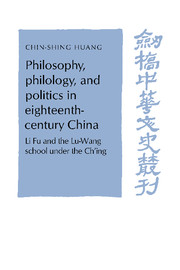 Philosophy, Philology, and Politics in Eighteenth-Century China
Philosophy, Philology, and Politics in Eighteenth-Century China Book contents
- Frontmatter
- Contents
- Foreword by Professor Ying-shih Yü
- Acknowledgments
- Abbreviations
- Introduction
- 1 The original argument (1): “Chu Hsi versus Lu Hsiang-shan” (Chu-Lu i-t'ung): A philosophical interpretation
- 2 The original argument (2): Wang Yang-ming and the problematic of “Chu Hsi versus Lu Hsiang-shan”
- 3 The critical dimension in the Confucian mode of thinking: The conception of the Way as the basis for criticism of the political establishment
- 4 Li Fu: an exemplary Lu-Wang scholar in the Ch'ing dynasty (1): His life
- 5 Li Fu: an exemplary Lu-Wang scholar in the Ch'ing dynasty (2): His thought
- 6 Li Fu and the philological turn
- 7 The price of having a sage-emperor: the assimilation of the tradition of the Way by the political establishment in the light of the K'ang-hsi emperor's governance
- Conclusion
- Chinese glossary
- Bibliography
- Index
6 - Li Fu and the philological turn
Published online by Cambridge University Press: 17 September 2009
- Frontmatter
- Contents
- Foreword by Professor Ying-shih Yü
- Acknowledgments
- Abbreviations
- Introduction
- 1 The original argument (1): “Chu Hsi versus Lu Hsiang-shan” (Chu-Lu i-t'ung): A philosophical interpretation
- 2 The original argument (2): Wang Yang-ming and the problematic of “Chu Hsi versus Lu Hsiang-shan”
- 3 The critical dimension in the Confucian mode of thinking: The conception of the Way as the basis for criticism of the political establishment
- 4 Li Fu: an exemplary Lu-Wang scholar in the Ch'ing dynasty (1): His life
- 5 Li Fu: an exemplary Lu-Wang scholar in the Ch'ing dynasty (2): His thought
- 6 Li Fu and the philological turn
- 7 The price of having a sage-emperor: the assimilation of the tradition of the Way by the political establishment in the light of the K'ang-hsi emperor's governance
- Conclusion
- Chinese glossary
- Bibliography
- Index
Summary
Li Fu's Comprehensive Compilation of Chu Hsi's Final Conclusion Arrived at Late in Life (Chu-tzu wan-nien ch'üan-lun), his Intellectual Lineage of the Learning of Master Lu (Lu-tzu hsüeh-p'u), and his study of the classics reflect the general intellectual climate of the high Ch'ing in which Li lived. The Comprehensive Compilation of Chu Hsi's Final Conclusion Arrived at Late in Life is typical of the evidential approach employed by philologists of that era. Li Fu himself was an active participant of the evidential approach movement. The philosophically minded among both the Ch'eng-Chu and Lu-Wang schools generally opted instead for establishing intellectual lineages. It is not unusual to find one or the other approach in a scholar of this time, but it is indeed peculiar to find both in one scholar. Li Fu is a good example of this unusual combination, and I will try to explain this apparent peculiarity.
The Comprehensive Compilation of Chu Hsi's Final Conclusion Arrived at Late in Life: an evidential approach to the problematic of “Chu Hsi versus Lu Hsiang-shan”
“Chu-Lu i-t'ung” (Chu Hsi versus Lu Hsiang-shan), which literally means “the similarity and dissimilarity between Chu Hsi and Lu Hsiang-shan,” has become an enduring issue in the history of Confucianism since the end of the Sung period. During their lifetimes both thinkers exchanged ideas on questions ranging from textual analysis to politics and metaphysics in order to make their stance clear to each other.
- Type
- Chapter
- Information
- Philosophy, Philology, and Politics in Eighteenth-Century ChinaLi Fu and the Lu-Wang School under the Ch'ing, pp. 107 - 142Publisher: Cambridge University PressPrint publication year: 1995


